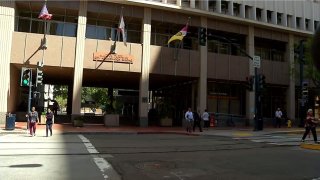
This article has been updated.
San Diego City Attorney Mara Elliott’s Chief of Staff asked a state senator’s office to delete emails sent during a 2019 effort to weaken the state’s public records law.
Deposition transcripts of Chief of Staff Gerry Braun and Deputy City Attorney Bill Gersten confirm the request was made. The city attorney's office had asked a judge to keep those depositions under seal but on March 7, a judge denied that request.
The deposition transcripts provide new details about a failed effort by Elliott’s office to restrict the public’s ability to obtain government documents and records. Elliot and State Senator Ben Hueso (D-San Diego) teamed up in early 2019 to propose limits on the California Public Records Act (CPRA).
Critics said Senate Bill 615 would harm government transparency by making it difficult for government watchdogs to sue public agencies that failed to comply with the CPRA.
Hueso withdrew his legislation last March after intense criticism from open government advocates. Those critics include attorney Cory Briggs, who is also a candidate for City Attorney.
Briggs also represents “San Diegans for Open Government,” a watchdog group. As that legal action progressed, Briggs interviewed Gersten and Braun under oath about their efforts to promote the controversial revisions to the CPRA.
A review of those deposition transcripts by NBC 7 Investigates reveals that Braun, a former journalist, admitted he asked Hueso staffer Aaron Brieno to delete one of Braun’s emails. Braun’s request to delete the email was made after Briggs sent Hueso’s office a public record request for copies of all legislative correspondence related to State Bill 615.
In his Sept. 12, 2019, videotaped deposition, Braun testified that he asked Gersten if he should have sent the email and if it could be protected from public disclosure by the attorney work-product privilege.
In his own deposition, Gersten said he advised Braun to ask Brieno to “clawback” the email, deleting it from the public record.
“I explained to Mr. Brieno that I had inadvertently provided him an email which contained confidential information and that I was now clawing back that email,” Braun testified. “I explained to him that he should not read the email, that he should not share the email with anyone else, and that he should destroy any copies of the email.”
The city attorney’s office asked Briggs to keep Gersten and Barun’s testimony confidential.
When Briggs refused that request, outside counsel representing the city attorney’s office asked a judge to prohibit Briggs from sharing that testimony with outsiders or using it in his campaign.
“The acrimonious history between Mr. Briggs and Mr. Braun and other (city) employees warrants a protective order,” argued attorneys from the city’s outside law firm of Colantuono, Highsmith, and Whatley. “The risk that (Briggs) will use the discovery process to ridicule, embarrass, or inflict reputational harm on (Braun and Gersten) is a real, concrete worry of the City and its employees.”
Briggs’ lawyers, who include former district attorney Paul Pfingst, opposed that request, arguing that there is “...no justification in the facts, in the law, or in public policy to issue a preemptive 'gag order’ against Briggs in an attempt to protect information the city has not shown to be private or prejudicial in any way.”
On Feb. 9, Superior Court Judge John Meyer denied the city’s request for a protective order.
“There is nothing in the deposition testimony that involves confidential, private, proprietary or sensitive information that needs protection,” Meyer wrote.
“The City Attorney’s reliance on Gerry Braun to do improper things that would jeopardize any lawyer’s law license is well-documented,” Briggs told NBC 7 Investigates.
“Any attorney can tell you that the ‘clawback’ request from the City Attorney’s Office is standard practice in the legal profession for correcting an accidental release of a confidential document,” said Leslie Branscomb, a spokesperson for Elliot’s office. “Our Office is concerned that Mr. Briggs is using his power to depose city employees as a way to create campaign advertising. He said he won’t do that, and the court’s ruling means we must take him at his word.”
Editor's Note - February 14, 2020: A previous reference to “attorney-client privilege” in the original story has been corrected to “attorney work-product,” and a reference to “prosecutors” has been corrected to “outside counsel representing the city attorney’s office.”
After the publication of this story, San Diego City Attorney Mara Elliott released a copy of the email at the center of this controversy. You can read that email and Elliott’s explanation for why she released it below. In response to follow-up questions from NBC 7 Investigates about the email, and Elliott’s decision to make it public, spokesperson Hilary Nemchik said, “The last email on the thread was privileged attorney work product, but the chain was inadvertently forwarded on to Senator Hueso’s staff by Gerry Braun. We are choosing to release it because Mr. Briggs has mischaracterized the email as well as the process by which it was inadvertently released and “clawed back,” a standard practice in the legal profession for correcting an accidental release of a privileged document. To be clear, no one asked for the destruction of a public record. The original record would always be retained by our office under the Government Code.”



